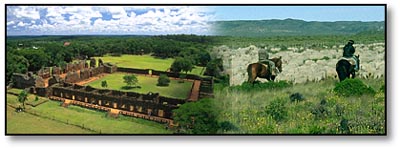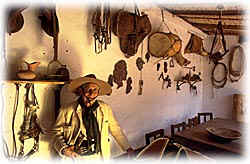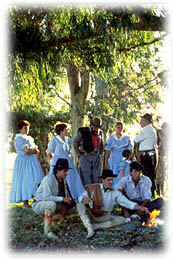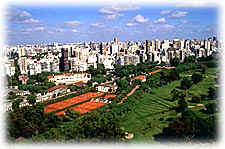
Argentina Home
History
Explorations
Calendar of Events
Travel Tips
Buenos Aires
Cordoba
Mar del Plata
Latin America
The World
History
 Along
with numerous nomadic tribespeople, two main indigenous groups existed in
Argentina before the European arrival. In the northwest, near Bolivia and
the Andes, was a people known as the Diaguita, while further south and to
the east were the Guarani. Together the Diaguita and the Guarani
constitute the origins of permanent agricultural civilization in
Argentina, both developing the cultivation of maize. The Diaguita are also
remembered for having successfully prevented the powerful Inca from
expanding their empire into Argentina from what is now Bolivia.
Along
with numerous nomadic tribespeople, two main indigenous groups existed in
Argentina before the European arrival. In the northwest, near Bolivia and
the Andes, was a people known as the Diaguita, while further south and to
the east were the Guarani. Together the Diaguita and the Guarani
constitute the origins of permanent agricultural civilization in
Argentina, both developing the cultivation of maize. The Diaguita are also
remembered for having successfully prevented the powerful Inca from
expanding their empire into Argentina from what is now Bolivia.
It was perhaps a legacy of this successful resistance that enabled the native peoples of Argentina to carry on a prolonged campaign against colonization and rule by the Spanish. The first Spaniard to land in Argentina, Juan de Solis, was killed in 1516, and several attempts to found Buenos Aires were stymied by the local inhabitants. Inland cities were more successful, and it wasn't until the late 16th century that Buenos Aires was securely established.
Despite its military success, indigenous resistance was inexorably
weakened by the introduction of diseases from Europe. Even after the
native threat became minimal, however, Argentina was still mostly
neglected by Spain, which was more interested in developing Lima and the
riches of Peru. Buenos Aires was forbidden to trade with foreign
countries, and the city became a smuggler's haunt. The restrictive trade  policy
probably did little to endear Spain to the colonists. The British attacked
Buenos Aires in 1806 and 1807, as Spain's had come under the control of
Napoleonic France. The colony managed to repulse Britain's attacks without
any assistance from their mother country, an act of strength that no doubt
helped to foster the region's growing sense of independence.
policy
probably did little to endear Spain to the colonists. The British attacked
Buenos Aires in 1806 and 1807, as Spain's had come under the control of
Napoleonic France. The colony managed to repulse Britain's attacks without
any assistance from their mother country, an act of strength that no doubt
helped to foster the region's growing sense of independence.
When the French captured Spain's King Ferdinand VII, Argentina fell completely under the rule of the local viceroyalty, which was highly unpopular. The locals rebelled against the viceroyalty and declared their allegiance to the captive king. By 1816, the deep division between Argentina and its mother country had become quite apparent, and a party of separatists decided to declare the country's independence. One of the new patriots, Jose de San Martin, crossed the Andes and captured Lima. Along with Simon Bolivar, Martin is credited with breaking the shackle of Spanish rule in South America.
Early independence in Argentina was marked by an often bitter struggle between two political groups: the Unitarists and the Federalists. The Unitarists wanted a strong central government, while the Federalists wanted local control.
Argentina's culture has been greatly affected by its immigrant population, mostly European. Their influence contributed to the demise of pre-Columbian cultures, resulting in the lack of a dominant indigenous population. The European immigrant groups each adopted different roles. The Basque and Irish controlled sheep rearing, the Germans and Italians established farms, and the British invested in developing the country's infra- structure.
 More
than one-third of the country's 32 million people live in Buenos Aires,
the capital, which along with other urban areas accounts for almost 90%
of the total population. The principal indigenous peoples are the Quechua
of
the northwest and the Mapuche in Patagonia. Other marginal groups include
the Matacos and Tobas in the Chaco and other northeastern cities. There
are strong Jewish and Anglo-Argentine communities throughout the country;
small communities of Japanese, Chileans and Bolivians; and
enclaves of Paraguayan and Uraguayan residents.
More
than one-third of the country's 32 million people live in Buenos Aires,
the capital, which along with other urban areas accounts for almost 90%
of the total population. The principal indigenous peoples are the Quechua
of
the northwest and the Mapuche in Patagonia. Other marginal groups include
the Matacos and Tobas in the Chaco and other northeastern cities. There
are strong Jewish and Anglo-Argentine communities throughout the country;
small communities of Japanese, Chileans and Bolivians; and
enclaves of Paraguayan and Uraguayan residents.
The universal language of Argentina is Spanish, but many natives and immigrants keep their mother tongues as a matter of pride.
Copyright (c) 1998-2012 interKnowledge Corp. All rights reserved.
